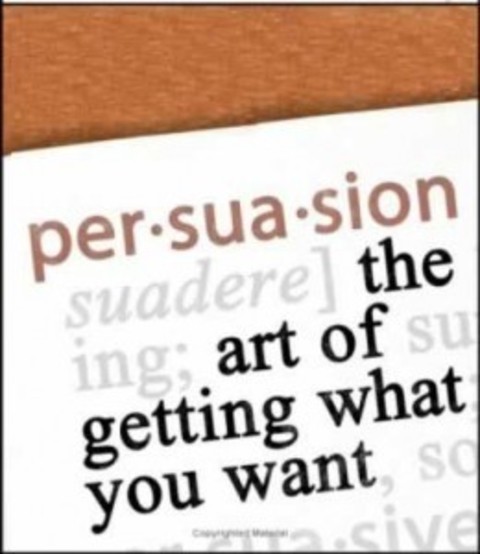Whenever I think of words of persuasion I always think of Mrs Doyle; the eccentric housekeeper from the television series Father Ted, shouting “Go on, Go on, Go on, Go on, GO ON!” when she is trying to persuade someone to have a cup of tea. This behaviour is at the not so subtle end of the scale of persuasion and rarely works because it makes someone feel coerced or forced into something; thereby taking their “power” away which will leave them with quite literally – a nasty taste in their mouths. The definition of persuasion according to businessdictionary.com is the “Process aimed at changing a person’s (or a group’s) attitude or behaviour towards some event, idea, object or other peron(s), by using written or spoken words to convey information, feelings or reasoning, or a combination of them.” And so what are the words of persuasion and how do we use them effectively? Whether you need to influence peoples’ thoughts and behaviours’ in a professional capacity – for example – you might be an M.P., Salesperson, Juror or whether you are simply would like to become more adept at persuading friends and family members to bend to your will – these following seven words are said to be some of the most effective tools to use.

The first powerful word of persuasion is “because” and the reason that this works so well is that firstly it is a word that links into our need for a clear definition of “cause and effect” as this is how we make sense of situations in our lives – e.g. “You need your umbrella because it is raining otherwise you will get wet”. “Because” is also a word that has its roots in childhood; our most formative years for speech and development. Everyone must remember a parent or authority figure saying to them “Because i said so!” and as small children; we presumed that that they knew best and so this can be used as a prompt for certainty and security when used in a positive manner. The second word we are going to look at is “now” and again; this word is intrinsically linked to childhood. When a parent refused to listen to our cajoling to be allowed to stay up later and said “It is bedtime – NOW” – this word acts like a full stop; leaving no room for manoevure because otherwise we may risk some kind of punishment/unpleasant result should we not obey! Again – this word – like “because” – can be used in a positive manner in order to persuade – for instance – if someoene were to say “Take advantage of this offer NOW” – there is the inherent implication that this is something desirable and only available for a short amount of time.
Powerful words of persuasion are even more effective when used together – for example – “I would like you to do this now because it would really mean a lot to me” taps into our need to be liked, accepted and rewarded by others and so a skilled negotiator will naturally link persuasive words together for extra impact.
A third powerful word is “imagine” and this is a favourite word of persuasion because you are not telling someone to do something and so no resistance is attached to it. Instead – you are asking someone to visualise/dream – a very subtle yet strong tool of negotiation. “Imagine” what this holiday would be like” for instance; allows us to conjur up fantasy type images as long as the rest of the selling techniques are positive.
“Please” and “thank you” are the fourth and fith words of persuasion. “Please” is considered a “magic” word i.e. if a child asks for chocolate we tend to say “what is the magic word?” and so this is a word we associate with power and wishes coming true. “Thank you” makes someone feel appreciated and rewarded – both powerful motivators for fulfilling the needs of others. “Thank you” for walking my dog – I really appreciate it” will most likely mean you will get your dog walked for you again!
The sixth word is a very individual and personal word because we are talking about the use of someone’s name in order to persuade them to do something. Again – this makes them feel important and creates a rapport between people. A word of caution however, is not to over-use a person’s name as this comes across as false and will make them feel manipulated. A simple sales technique uses the customer’s name at the beginning and the end of a conversation – for example “Hello “John”, I would like to offer you a very special business proposition today” …finished by “It’s been good to talk to you “John” because i really feel we can benefit each other here. Thank you very much for your time – I really appreciate it”. Again – note the use of several powerful words of persuasion used together.
The seventh and final word is not really an individual word but a collection of words that we associate with “control“. Life is full of uncertainty and danger and so any word that makes us feel safe/secure etc are very powerful words of persuasion. Statements such as “You’re in control”, “You’re in charge of this” give reassurance and the sense that we are masters’ of our own destiny – which is ultimately what all of us want to feel.
This post was contributed by thegappartnership.com

